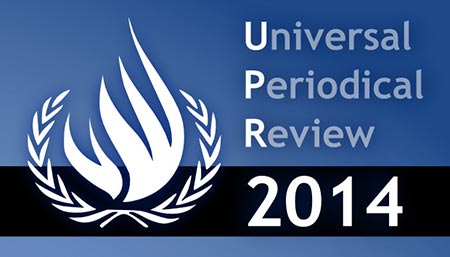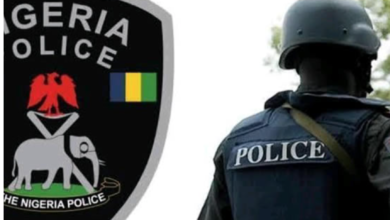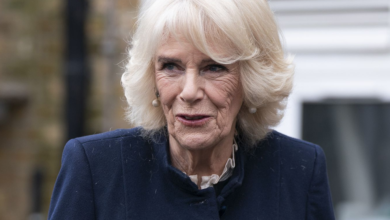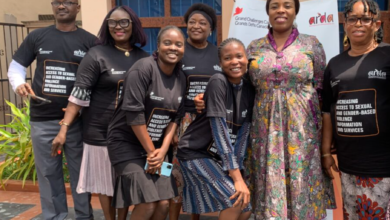Zonal Confab, UPR hold

2 DAY ZONAL CONFERENCE (SOUTH WEST) ON THE NATIONAL ACTION PLAN AND THE UNIVERSAL PERIODIC REVIEW: 7 TH –8 TH AUGUST 2014 AT THE CHESTERFIELD HOTEL
Meeting overview and logistics
This conference is part of a larger project on domestic accountability for human rights in Nigeria through CSO engagement with national,regional and international bodies and is supported by Mac ArthurFoundation.The Goal of the project is to The overalll goal of this project is toadvance human rights situation in Nigeria through strategicengagement with national, regional and international human rightsinstruments from 2012 – 2014.
The objectives of the project are
1. To strengthen the capacity of advocates to actively engageinternational and regional human rights instruments and holdthe government accountable to its human rights obligations
2. To facilitate involvement of civil society organizations andhuman rights advocates in developing a CSO reports that willbe used to demand accountability from the government from2013 – 2015
3. To create linkages between international human rights mechanisms and national and state mechanisms for the protection and promotion of human rights
4. To domesticate international human rights commitments byreviewing the NAP document in line with Nigeria’s recent humanrights obligations.
Brief overview on the UPR and the NAP
The Universal Periodic Review (UPR) is a unique process whichinvolves a review of the human rights records of all 192 UN MemberStates once every four years. The UPR is a significant innovation ofthe Human Rights Council which is based on equal treatment for allcountries. It provides an opportunity for all States to declare whatactions they have taken to improve the human rights situations intheir countries and to overcome challenges to the enjoyment ofhuman rights. The UPR also includes a sharing of best human rights
practices around the globe. Currently, no other mechanism of thiskind exists. On March 4th and July 22nd, 2013, CSOs and the Nigerian governmentsubmitted to the Office of the UN High Commissioner for HumanRights a report on the human rights situation in Nigeria, inaccordance with Universal Periodic Review (UPR) process.
The report’s submission leads to a formal presentation by theNigerian government to the UN Human Rights Council in Geneva on25th October, 2013 during the 17th session of the UPR process. At theend of the presentation which was made by Nigerian delegates whichwas lead by the Hon. Attorney General and Minister Of JusticeMohamed Adoke, about 172 recommendations on the promotion andprotection of human rights were made by various State Parties.
CSOs and Coalition members of the UPR, stakeholders in governmentand the public in general are therefore encouraged to expedientactions on how to hold the government accountable on the variousrecommendations particularly on how it relates to our variousthematic areas.
Group presentation.Group 11. International Instrument.Articles: 135.2, 3, 4, 6, 8 and 10.Stakeholders: Ministries of Foreign Affairs, Women Affairs, Finance,National Assembly, Media and CSOsAction Plan: Advocacy Visit to the various ministries, Seminars andworkshops, lobbying, enlightenment and awareness campaign,engage CSOs on treaty bodies and all reports.
2. ESC .Articles: 135. 1, 6, 129, 130, and 131Stakeholders: Ministries of foreign Affairs, Finance, Labour andProductive, NLC/TUC, Media, National Assembly.
Action Plan: Advocacy Visit to the various ministries, lobbying,partnering with organised Labour, enlightenment and awarenesscampaign, Press conferences and media chart.3. Women’s Rights.Articles: 135.55, 7, 12, 18, 58, 63.Stakeholders: Ministry of Women Affairs, (National and States),Ministry of Justice, Law enforcement agencies, Ministry of informationand communication, Ministry of health and media.
Action Plan: Advocacy, Legal Action, Media Campaign,Constitutional Review, Selective legislation on CEDAW.
4. CRC.Articles: 135.12, 89, 92, 93, 94.Stakeholders: Ministry of Foreign Affairs, Ministry of Women Affairs,Ministry of Finance, Media, CSOs. Action Plan: Advocacy, Enlightenment and awareness, campaign
Group 21. Corruption Identification of the relevant Law Reviewing the relevant laws to bring them to conform tointernational best practices.
Holding the government accountable on their commitment ofupholding the UNCAC laws to which it is signatory. Eg byadvocacy, media engagement, the FOI. Independency of the agencies by reviewing their tenure toinsulate them from political control CSOs should be more vocal on corruption issues and engage themedia to publicise these issues.
ustice CSOs to engage relevant communities of the National Assembly Engage the media Identify other lower officers for long term Continuity. Government should implement recommendation contained inthe various past and present presidential committees on policereform by successive government from 2006. HRW, AmnestyInternational .etc To engage the National Assembly to review relevant Laws,criminalising Torture with punishment for perpetrators.
3. Death Penalty CSOs to engage government to adopt the option of moratoriumof the Death Penalty4. CSOs CSOS should reconsider their approach of engagement withgovernment CSOs should commend the government when the right thing isdone in order the change their perception about CSOs
5. Human Rights Education and Training Inclusion of HRE into school’s Curriculum Government officials should be training on HR CSOs should organise HR training regularly in schools CSOs should initiate HR clubs in the informal sector. Eg Marketplace, place of worship, parks etc.
Group 3
1. DisabilityIncorporate into municipal law the OP CRPD There is a national bill which has passed both houses and isbefore a joint harmonization committee before it is presentedfor assent. 4 states currently have laws on special people (Plateau, Bauchi,Lagos and Ekiti).Focus on other states passing Special personslaws. Steps should be taken to domesticate the CRPD CSOs work with Government to ensure domestication.Strengthening Framework on human rights instruments includingCEDAW and CRPD There are many laws which can be traced to CEDAW e.g laws onFGM,GEOB 5 states have suspended passing of the child rights law. Agencies responsible are the Ministry of Education, NationalAssembly, State House,Joint Committee on Harmonization at theNational Level,NHRC.
Implement UBE for children with disabilities. Agencies responsible is MOE.MYSD,MWASD Free education with all barriers removed for all children withdisabilities.Adopt national policy on CWD and ensure access to education andhealth services The child rights laws should be properly implemented. MOE, MYSD, MWASD. Ensure there are more inclusive schools for PWdS.
2. Civil and Political Rights 1. ElectionsImplement the 2011 EU observation Mission recommendationsconcerning the equal participation such as to provide assistances toIDPs and prosecute people involved in election violence.
Electoral systems must be inclusive of PWDs, prisoners etc Agencies responsible INEC. Also electoral laws must be inclusive.Further raise public awareness on the equal rights of PWDs Engaging CSO,MWASD.
3. SECURITYContinue its successful and productive measures to counter andeliminate threats of militant insurgents and organized crime groups. Law enforcement agencies (Police, army, JTF) It has gone beyond eliminating threats. Lots of rights are not being affected especially girls and women
Strengthen measures to improve security in the whole country Work with security agencies and counter terrorism unit.Intensify effortsagainst organized crimes, including terrorism andimpunity of perpetrators. Government ensure the rights of citizens are protected at alltimes. Take steps like negotiating to save lives of citizens. Security agencies .
Ensure perpetrators of violence are brought to justice and that thesecurity forces rules of engagement take full account of due processof human rights. Approaching local courts, regional courts, Commissions and theICC to bring perpetrators to book. Lawyers, CSOs have a role of play. Ensure security agencies try perpetrators in their custody.
Take further steps to restore security with due consideration to therule of law and human rights.
The counter terrorism strategies should take human rights intocontext. Intense human rights training for security agencies Security agencies, cso
4. Freedom of ReligionPromote the right to freedom of religion There is a unit of religious affairs in every state. Engage National Supreme Council of Islamic Affairs, faith basedorganisation like CAN, Christian Council of Nigeria, NRI,NASFAT,PFN, African traditional religious leaders, Communityleaders. Set up centres to get information from citizens like earlywarning signs.
5. ENVIRONMENT Continue to take measures to guarantee the right that its peoplehave to enjoy a sustainable environment. Adaptation strategy has been adopted .We await animplementation plan. Addressing the issue of economic and non economic damagesarising from climate change. Compensation should be paid to victims of climate change. Agencies to engage NEMA,NESRAE, Ministry of environment, oilcompanies working in Niger Delta.
The rights of host communities should be protected and theremust be continuous engagement with them. The OgoniUNEP report must be implemented. Oil companies must publish what they pump. The oil companies must address environmental issues in theirCSR initiative. Terminate gas flaring in Nigeria



